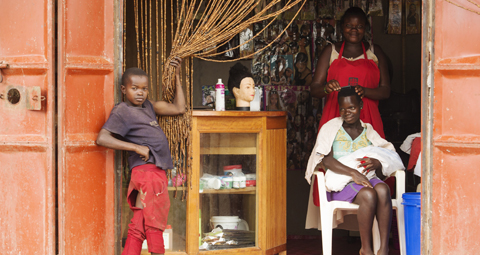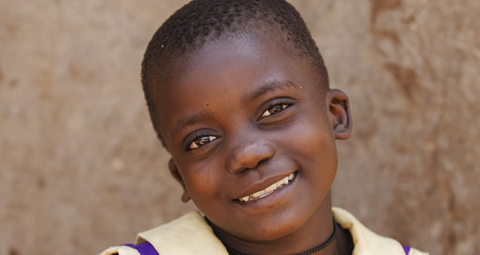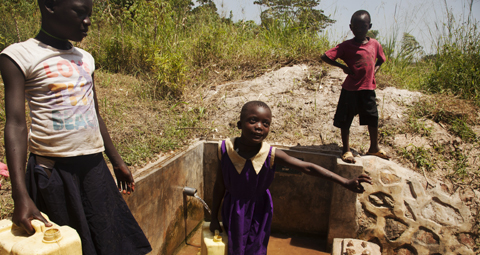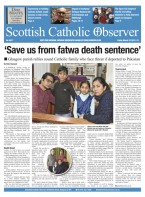BY Peter Diamond | March 8 | ![]() 0 COMMENTS
0 COMMENTS ![]() print
print

Faith and hope in Uganda
In a special report from Uganda, Peter Diamond describes one woman’s journey from poverty to a small business owner and how donations from Scottish Catholics are helping transform thousands of lives in a land still recovering from years of strife.
Ten years ago Lydia Kyebalyenda was forced to leave her village in Bugiri district in the pearl of Africa after becoming pregnant at the age of 16.
Before that, the Ugandan endured a childhood with no education, where her seven brothers and sisters sometimes went without food because there wasn’t enough money in the family to feed them all.
To compound her dire upbringing her days were often spent walking miles to fetch water, only to later get sick because the water was contaminated.
When the rainy season came and the mosquitos increased in number, members of her family would often contract malaria because there were too few protection nets to cover the entire family at night.
Now 26, Lydia, a single mum, has three daughters of her own and two adopted sons whom she took in following the collapse of her sister’s marriage.
As I interviewed Lydia in her mud hut among the lush trees of Africa it was evident that her life had charted a journey from the depths of poverty to a place where she was thriving thanks to the intervention of SCIAF—and that’s something she thanks God for.
Over the past decade she has endured and suffered both the emotional and physical demands of her chaotic and turbulent situation.
After she found out she was pregnant she was kicked out of her village. She married the father of her child and he persuaded her to come and live in Bugaryi village, because he had relatives there.
Lydia said: “I felt angry and disappointed when I was kicked out because I had no intention of getting pregnant so young and by the time I realised I was pregnant the man who got me pregnant had left and returned to his village.
“My parents were extremely annoyed because I had got pregnant at such a young age.
“In the beginning of our relationship [my child’s father] knew I couldn’t afford anything so he persuaded me to start a relationship and move to this village, but he made a lot of false promises.”
In Ugandan villages polygamy is common and in Lydia’s case this meant a breakdown of her marriage and relationship.
“At first our relationship was OK but it wasn’t long before he started seeing other women which made me very annoyed and he ended up abandoning me after my third child was born, by running away with another woman from the village,” Lydia said.
The situation left Lydia hopeless and helpless. She was forced to carry out backbreaking work in the sunbaked fields just to feed her family.
It seemed as though the vicious cycle, which had ghosted her upbringing, was back again to haunt her children.
Lydia said: “When he abandoned me it had a massive impact because I had to do manual labour in the gardens and fields of the village in order to make a living.
“I never got the payment at once, but 3,000 shillings per week if I was lucky which is less than 75p per week.
“People would give me work in the morning so I would get up very early and feed my children what I could and then go to work.
“In the afternoon I would come home and prepare food for the evening before going back to do more work in the field until sundown. It was exhausting and I lost so much weight.”
For months Lydia survived on nothing but boiled potatoes morning and night for her energy and sometimes she would be paid in food for her work.
Lydia added: “I cooked potatoes from the gardens and that was really all I lived off. I just ate plain potatoes as my source of food and energy during that time of my life.
“I couldn’t afford bananas so then I would be paid by some people in cassava [a root vegetable] for work.”
Lydia became visibly upset when she revealed her fears for her family’s future.
But SCIAF’s intervention with their Caritas Lugazi partnership changed that.
“In my mind I had endless thoughts and fears about how I would sustain my children and their future,” said Lydia.
“I couldn’t send my children to school because I couldn’t afford the books, uniform, and equipment. I was in despair and remained helpless and hopeless in my situation—until Caritas came to our village in January 2017.”
Since that day in January 2017 Lydia and her children’s lives has been transformed.
Donations from Scotland have enabled SCIAF to grow great relationships with Caritas Lugazi, a charitable project of the Catholic Church in Uganda.
Their arrival in Lydia’s village has been so transformative and progressive that she has gone from being a poor peasant farmer to an entrepreneurial businesswoman who is respected in the community.
Lydia firstly enrolled in a sustainable living project where she was assisted by SCIAF with tools and training in farming, coupled with basic skills in numeracy and literacy in order to have basic awareness of savings.
SCIAF supplied Lydia with maize seeds, beans, banana combs and tools and equipment to nurture and harvest the crops, which were fast-yielding.
The project also included an induction into a savings and loans co-operative, which meant that farmers like Lydia were able to save collectively and strengthen their profits.
With these profits SCIAF encouraged the partners to invest in a career they wanted to pursue. For Lydia, that was hairdressing and the mother-of-five has now given the chop to hunger thanks to her successful enterprise.
Lydia said: “I chose hairdressing because it was manageable for me because I never went to school. Caritas and SCIAF gave me the skills to finance my training and I soon started with a mobile hair salon with the tools and would go to people’s homes.”
The salon is no longer in transit because Lydia now has opened her own salon in a disused unit in the village, meaning she can earn up to £2.50 per head and she can serve three or four clients per day.
On top of her salon Lydia still operates a small farm, putting paid to her desperate situation of just a couple of years ago. Lydia said: “My life has changed significantly since the project intervened in my life. I can provide food for my family and send my children to school with uniforms and all the materials.
“My children are happy now and are not jealous of others they go to school with. They have a normal upbringing.
“After generating enough income I opened the salon in October 2018. I was so excited to open and my clients could find me for service now in the village at an office. I can work on more heads everyday and I can train people in the village.
“On top of my hairdressing I was still making money with my farming.
“I work in the morning and go to the farm to work and then I’ll come back to the village and look for clients.
“I only sell my fruit to the people who come to the village looking for food but one day I hope to have enough to rent a stall at the market,” she said.
“The project has empowered me to work hard and work smart and that is how I have become successful, so much so that people in the village have a lot more respect for me.”
Throughout her troubled life Lydia has maintained a belief in God—and this Faith was clear to see, with a Jesus calendar on display in her mud hut house wall, one of her few token possessions.
“I am Catholic. I go to a neighbouring church, which is about a walk of one hour. I know God and I love Him so much. He has been able to touch my life and to lead me to where I am now.
“Previously I used to pray so hard to Him to respond and rescue me, for I never wanted my family to live the kind of life that I had endured growing up. He has answered my prayer and I thank Him everyday.”
To get your own Wee Box, make a donation or find out more about the appeal visit www.sciaf.org.uk












